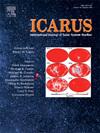How might a planet between Mars and Jupiter influence the inner solar system? effects on orbital motion, obliquity, and eccentricity
IF 2.5
2区 物理与天体物理
Q2 ASTRONOMY & ASTROPHYSICS
引用次数: 0
Abstract
As implied by exoplanet population censuses, super-Earths are extremely common in the galaxy. In the solar system, models suggest that the formation of an Earth-to-super-Earth mass planet could have readily occurred in the inner regions ( AU) if such body is able to survive the early intense and chaotic intertaction episodes of the Jovian worlds with the rest of the solar system. In this study, we test the consequences of such a hypothesis using a three-dimensional (3D) N-Rigid-Body integrator. With a 3D model in which the planet is modeled as a rigid body to account for its finite size and rotation, we simulate the orbital evolution of the three inner terrestrial planets over 2 Myr periods. Our results show that an additional super-Earth sized planet between 2 and 3.5 AU would have (i) destabilized Earth’s orbit over timescales of 1-2 Myrs, (ii) increased Mars’s obliquity by , and (iii) perturbed the eccentricity of Venus by up to . Our study explores an “alternate fate” of the terrestrial planets and our results suggest that the formation of a super-Earth in the inner solar system would have exerted grave consequences for the orbital dynamics and habitability of the terrestrial planets.
火星和木星之间的行星会如何影响内太阳系? 对轨道运动、斜度和偏心率的影响
正如系外行星数量普查所暗示的那样,超地球在银河系中极为常见。在太阳系中,模型表明,如果地球质量到超地球质量的行星能够在早期太阳系其余部分与类木行星世界激烈而混乱的撞击事件中幸存下来,那么这种天体很容易在内部区域(<3 AU)形成。在这项研究中,我们使用一个三维(3D)N-刚体积分器来检验这种假设的后果。在三维模型中,行星被模拟为一个刚体,以考虑其有限的大小和自转,我们模拟了三颗内行星在 2 Myr 周期内的轨道演变。我们的研究结果表明,如果在 2 至 3.5 AU 之间再增加一颗超地球大小的行星,将会:(i) 在 1 至 2 Myrs 的时间尺度内破坏地球轨道的稳定;(ii) 使火星的斜度增加 ∼ 55°;(iii) 使金星的偏心率受到高达 e∼0.4 的扰动。我们的研究探讨了陆地行星的 "另一种命运",我们的结果表明,内太阳系中超级地球的形成将对陆地行星的轨道动力学和宜居性产生严重后果。
本文章由计算机程序翻译,如有差异,请以英文原文为准。
求助全文
约1分钟内获得全文
求助全文
来源期刊

Icarus
地学天文-天文与天体物理
CiteScore
6.30
自引率
18.80%
发文量
356
审稿时长
2-4 weeks
期刊介绍:
Icarus is devoted to the publication of original contributions in the field of Solar System studies. Manuscripts reporting the results of new research - observational, experimental, or theoretical - concerning the astronomy, geology, meteorology, physics, chemistry, biology, and other scientific aspects of our Solar System or extrasolar systems are welcome. The journal generally does not publish papers devoted exclusively to the Sun, the Earth, celestial mechanics, meteoritics, or astrophysics. Icarus does not publish papers that provide "improved" versions of Bode''s law, or other numerical relations, without a sound physical basis. Icarus does not publish meeting announcements or general notices. Reviews, historical papers, and manuscripts describing spacecraft instrumentation may be considered, but only with prior approval of the editor. An entire issue of the journal is occasionally devoted to a single subject, usually arising from a conference on the same topic. The language of publication is English. American or British usage is accepted, but not a mixture of these.
 求助内容:
求助内容: 应助结果提醒方式:
应助结果提醒方式:


